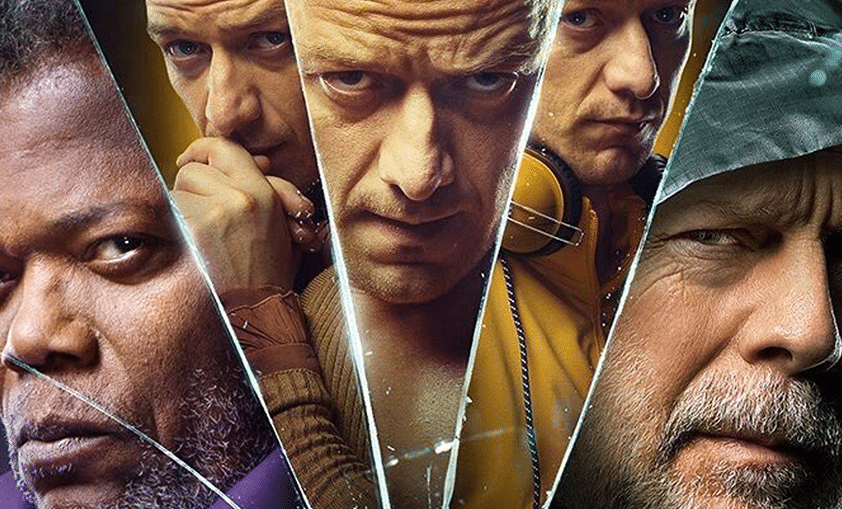Is “Glass” worth a winter date night? Yes!
The film is a unique sequel to two completely different films by uniquely brilliant twist-ending master filmmaker M. Night Shyamalan. “Glass” is a fast-paced, thinking-man’s thriller with a trio of outstanding star performances by Bruce Willis, Samuel L. Jackson and James McAvoy. This one will keep you snuggled up tight with your date as you face the fear together. Better yet, its PG-13 status means no one has to be grossed out along the way.
Sequels seem to come out almost weekly in America’s theaters. After all, they’re a guaranteed way to make some solid bucks. But they’re rarely as good as their predecessors, because the sense of surprise and wonder is gone.
This week brings us “Glass,” which has the rare and perhaps unprecedented status of being a sequel to two entirely different films with vastly different story lines. In one of the most gasp-inducing endings ever to a film, the auteur revealed that Bruce Willis’ character from his 2000 film “Unbreakable” was in the same universe as the insanely evil character nicknamed The Horde in 2017’s “Split.”
TRAILER:
Two great movies come together for an even greater “threequel”

Willis’ David Dunn was a man who suddenly developed superhuman strength after being the lone survivor of a horrific train crash. The crash killed hundreds in the opening moments of “Unbreakable.” Dunn used those skills along with the fact that he could suddenly see flashbacks of the life of any person he touched. He gained instant insight into whether people were good or evil. He became a vigilante in that film.
“Split” focused on a man with 24 personalities, nicknamed The Horde (James McAvoy). He has one particularly brutal persona with super-strength known as The Beast. In the film’s closing moments, he evaded capture and fled on an impending rampage across Philadelphia. Shyamalan revealed that Willis’ Dunn was watching the news coverage on a diner television, vowing to take him down.
The moment sent shock waves through viewers. Most shocked were fans who had long pined for a sequel to “Unbreakable” since that film set up a showdown between Dunn and an evil genius named Elijah Price, played by Samuel L. Jackson. Price called himself by the nickname Mr. Glass. He plotted evil revenge on society via the train derailment and other tragedies because of his bitterness over having a bizarre lifelong condition in which nearly any physical contact could result in broken bones.
Wildly original characters

Dunn searches for The Horde on his vigilante patrols of Philadelphia’s seedier neighborhoods. He finds The Horde walking around while holding four high school cheerleaders hostage in an abandoned loft. When the two engage in a battle royale while the girls flee, they both wind up captured by the police. The officials throw them into a suburban mental hospital where Glass is already a longtime patient.
It is there that enigmatic psychologist Ellie Staple (Sarah Paulson) brings the odd trio together to conduct an elaborate experiment. She wants to prove that they don’t actually have superpowers and are merely delusional. She has three days to break them of their super-heroic mindsets. Yet in those three days, Glass intends to manipulate Dunn and The Horde into carrying out his most vicious crime yet.
A unique look that’s impossible to turn away from

Shyamalan employs an unusual story structure in “Glass.” He winds up with a film that is both everything a fan of the prior films could want, and yet utterly unexpected. One might assume the showdowns between these three highly gifted individuals would take place on a broad, epic scale across the entire Philadelphia cityscape.
Instead, the film takes a tightly wound, claustrophobic approach as the three supermen are forced to interact within the confines of the hospital’s halls. Paulson twists the mental screws on each of them. McAvoy once again puts on one of the most incredible acting displays imaginable by seamlessly flowing through the personalities of a perpetual 9-year-old boy, a haughty British woman, and many more within a single speech.
Jackson spends the first half of the film as an apparent zombie who’s heavily sedated by a wide range of psych medications. He brings a fun sense of menace when he finally springs to life for the second half of the film. Willis is older and more muted than usual here. His white beard makes him appear weary to the unwitting world around him. But he’s hiding an impressive fury when pushed to his boiling point.
Shyamalan leaves plenty to the imagination

One huge plus in “Glass” is that The Horde doesn’t victimize women throughout the story line, as he did in “Split.” His actions left a nasty misogynistic undertone throughout much of the previous film. Here, he is on a more even playing field in terrorizing men, too. Shyamalan further keeps the proceedings more fun (yet still scary) by leaving more of the violence implied and in viewers’ imaginations.
Shyamalan’s shot compositions are impressive to behold throughout. They make “Glass” often appear like a living, breathing artwork. The film induces grins in this reviewer throughout over his audacious shot and color choices. Bringing it all home is the superb score of West Dylan Thordson. The composer provides just the right sonic backdrop for the roller-coaster events throughout.
As always, Shyamalan has a couple of surprising twists in store for viewers. One shocker drew a loud gasp from this reviewer. But his final move is also an inspiring one. He gives both the characters within the film and viewers sitting in theaters a jolting yet inspiring reminder that the ability to be a hero for others truly does lie within us all.
The breakdown
Story: 10 out of 10
Characters: 10 out of 10
Acting: 10 out of 10
Thrills: 10 out of 10
Overall: 10 out of 10



